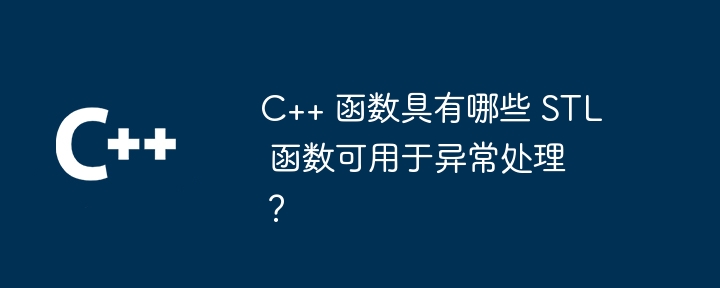++ 中用于异常处理的 stl 函数有:std::exception:异常的基础类std::bad_alloc:内存分配失败std::bad_cast:无效转换std::bad_typeid:无效类型 idstd::bad_array_new_length:无效数组长度std::_error:算术运算溢出std::range_error:索引超范围或范围值无效

C++ 函数具有哪些 STL 函数可用于异常处理?
异常处理:
异常处理是处理异常情况的技术,如内存分配错误、除零错误等。
STL 异常处理函数:
立即学习“”;
标准模板库 (STL) 提供了几个函数,可用于处理 C++ 中的异常:
- std::exception:表示异常的基础类。
- std::bad_alloc:由内存分配失败引发。
- std::bad_cast:由无效转换引发。
- std::bad_typeid:由无效类型 ID 引发。
- std::bad_array_new_length:由 new[] 运算符分配的数组的无效长度引发。
- std::overflow_error:由算术运算溢出引发。
- std::range_error:由超出范围的索引或其他无效范围值引发。
实战案例:
以下代码展示了如何使用 STL 函数处理异常:
#include <iostream> #include <stdexcept> void divide(int a, int b) { try { int result = a / b; std::cout << "Result: " << result << std::endl; } catch (const std::bad_alloc& e) { std::cerr << "Memory allocation error: " << e.what() << std::endl; } catch (const std::overflow_error& e) { std::cerr << "Arithmetic overflow error: " << e.what() << std::endl; } catch (const std::range_error& e) { std::cerr << "Range error: " << e.what() << std::endl; } catch (const std::invalid_argument& e) { std::cerr << "Invalid argument error: " << e.what() << std::endl; } catch (const std::exception& e) { std::cerr << "Unhandled exception: " << e.what() << std::endl; } } int main() { try { divide(10, 0); } catch (const std::overflow_error& e) { std::cerr << "Caught division by zero" << std::endl; } return 0; }
登录后复制
在此示例中,divide() 函数使用 try-catch 块来处理可能会引发的异常。如果发生异常,它会根据异常类型打印相应的错误消息。
以上就是C++ 函数具有哪些 STL 函数可用于异常处理?的详细内容,更多请关注php中文网其它相关文章!
 微信扫一扫打赏
微信扫一扫打赏
 支付宝扫一扫打赏
支付宝扫一扫打赏

